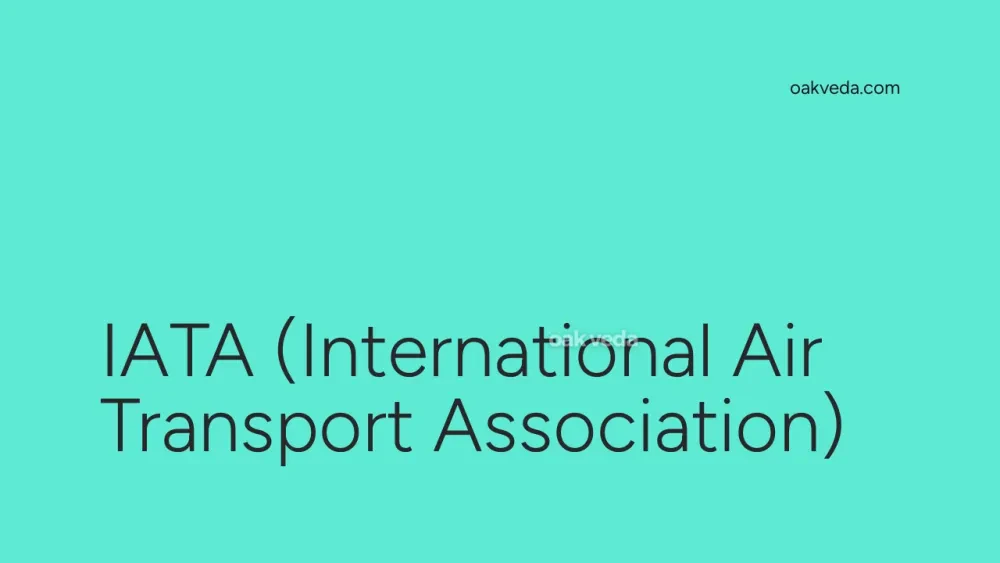
What is the Full Form of IATA?
The full form of IATA is the International Air Transport Association. This global organization plays a crucial role in shaping the aviation industry worldwide, serving as a cornerstone for cooperation and standardization among airlines.
What is International Air Transport Association?
The International Air Transport Association (IATA) is a private organization that serves as the primary vehicle for inter-airline cooperation in promoting safe, reliable, secure, and economical air services. Founded in 1945, IATA has grown to become the voice of the airline industry, representing approximately 290 airlines or 82% of total air traffic.
Origin and Development of IATA
The roots of IATA can be traced back to 1919 when its predecessor, the International Air Traffic Association, was established in The Hague, Netherlands. However, the modern IATA was founded in Havana, Cuba, in April 1945. At its inception, IATA had 57 members from 31 countries. Over the decades, it has expanded its reach and influence, adapting to the evolving needs of the aviation industry.
How does IATA work?
IATA operates by bringing together airlines, airports, and other stakeholders in the aviation industry. It develops global commercial standards, provides training and consulting services, and advocates on behalf of its members. The organization works closely with governments and international organizations to ensure that aviation policies and regulations are aligned with industry needs and best practices.
Functions of IATA
IATA's functions encompass a wide range of activities crucial to the smooth operation of the global air transport system:
-
Safety: IATA prioritizes safety through initiatives like the IATA Operational Safety Audit (IOSA), which has become the global benchmark for airline operational safety management.
-
Security: The organization works to enhance aviation security measures worldwide.
-
Financial Services: IATA provides financial systems that facilitate the settlement of accounts between airlines and travel agents.
-
Standardization: It develops and maintains industry standards for ticketing, baggage handling, and other operational aspects.
-
Training: IATA offers extensive training programs for aviation professionals.
-
Environmental Sustainability: The organization leads initiatives to reduce the aviation industry's environmental impact.
Applications of IATA
IATA's work has numerous practical applications in the aviation industry:
- Airline Codes: IATA assigns two-letter codes to airlines for identification purposes.
- Airport Codes: The organization maintains the system of three-letter airport codes used worldwide.
- Travel Agent Accreditation: IATA accredits travel agents, enabling them to sell international airline tickets.
- Cargo Handling: It develops standards for the safe and efficient transport of air cargo.
- Passenger Experience: IATA works on improving various aspects of air travel, from check-in processes to baggage handling.
Features of IATA
Key features of IATA include:
- Global Representation: With members from across the world, IATA truly represents the global aviation industry.
- Industry Leadership: It provides thought leadership on critical issues facing the aviation sector.
- Data and Analysis: IATA produces valuable industry statistics and forecasts.
- Innovation: The organization drives technological advancements in air transport.
- Collaboration: IATA facilitates cooperation between airlines and other industry stakeholders.
Benefits of IATA
IATA's work brings numerous benefits to the aviation industry and travelers:
- Improved Safety: Through its safety programs and audits, IATA helps maintain high safety standards across the industry.
- Cost Savings: Standardization and efficient processes lead to significant cost savings for airlines.
- Simplified Travel: IATA's initiatives like e-tickets and bar-coded boarding passes have made air travel more convenient for passengers.
- Environmental Progress: The organization's sustainability efforts contribute to reducing aviation's environmental footprint.
- Industry Growth: By addressing challenges and promoting best practices, IATA supports the sustainable growth of air transport.
Limitations or Challenges of IATA
Despite its significant contributions, IATA faces several challenges:
- Regulatory Complexity: Navigating diverse national regulations and harmonizing global standards can be challenging.
- Emerging Technologies: Keeping pace with rapid technological advancements in aviation requires constant adaptation.
- Environmental Concerns: Balancing industry growth with environmental sustainability remains a significant challenge.
- Competition Issues: Ensuring fair competition while representing a diverse membership can be complex.
Future Developments in IATA Technology
IATA continues to drive innovation in the aviation industry. Future developments may include:
- Biometric Technology: Expanding the use of biometrics for seamless travel experiences.
- Blockchain Applications: Exploring blockchain for more efficient and secure industry processes.
- Artificial Intelligence: Implementing AI for improved operations, customer service, and safety.
- Sustainable Aviation Fuels: Advancing the development and adoption of sustainable aviation fuels.
FAQs on IATA Full Form
-
What does IATA stand for? IATA's full form is the International Air Transport Association.
-
When was IATA founded? IATA was founded in April 1945 in Havana, Cuba.
-
Where is IATA headquartered? IATA's headquarters are in Montreal, Canada, with another main office in Geneva, Switzerland.
-
How many airlines are members of IATA? As of 2023, IATA represents approximately 290 airlines.
-
What is the IATA Operational Safety Audit (IOSA)? IOSA is an internationally recognized evaluation system designed to assess the operational management and control systems of an airline.
In conclusion, the International Air Transport Association (IATA) plays a vital role in shaping the global aviation landscape. From its humble beginnings in 1945 to its current status as the voice of the airline industry, IATA continues to drive progress, safety, and efficiency in air transport. As the aviation sector faces new challenges and opportunities, IATA's work remains crucial in ensuring a sustainable and prosperous future for air travel worldwide.
You may be interested in:

